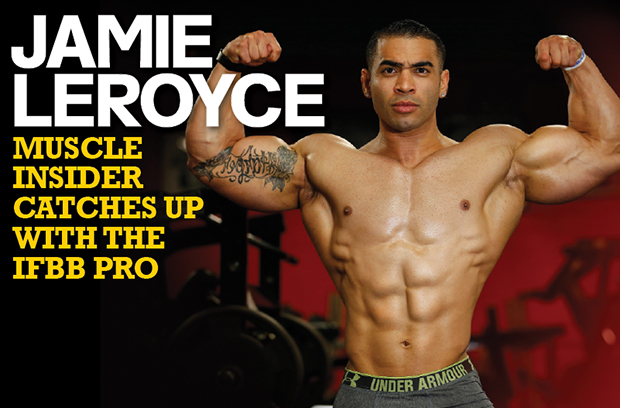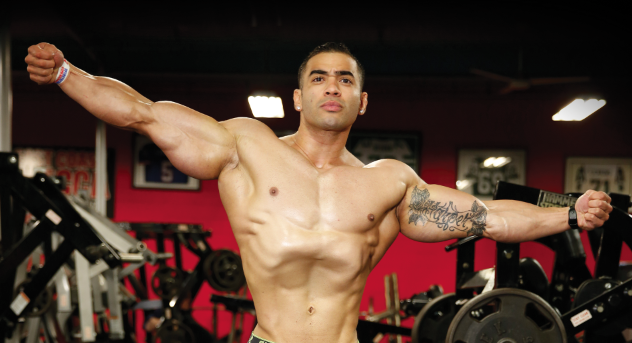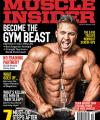Jamie LeRoyce Interview

MUSCLE INSIDER Catches Up with the Ambitious IFBB Pro and APS/Hi-Tech Athlete
Jamie LeRoyce knows that you may not be familiar with his name or contest history yet because he’s just a rookie, but he’s confident (and we’re sure) that by the end of the 2017 season he’s all you’ll be talking about. He’s slowly carving out his niche and his name in the industry. The former NPC Men’s Physique competitor turned IFBB Classic Physique Pro has a showstopping physique, but even more importantly, the attitude and perspective he brings to the sport is one of a kind. He wants to change the sport for the better, and is already coming to the table with ideas that are bound to make it more popular. He’s sponsored by—and more importantly, has the support of—one of the biggest supplement companies in the industry, and with APS, his physique, and his bright, optimistic attitude, look for him to carve out his own path this year. So remember the name.
MUSCLE INSIDER: It’s your rookie year as an IFBB Pro. You just placed sixth at the prestigious Pittsburgh Pro and sixth again at the New York Pro. What was that feeling like?
JAIMIE LEROYCE: Happy, but not satisfied, obviously. Between Pittsburgh and New York, my mentality was different. I had to adjust to the judges, and what they wanted to see in terms of aesthetics. I knew what to expect on the east coast, coming from Pittsburgh; the difference is that they like them bigger in the west. The east coast is about conditioning and aesthetics. They definitely like ‘em big in the west. This was definitely a great showing for my first year. I’m a rookie, and to place in the top 10 in my first year at the NY Pro and the Pittsburgh Pro is huge. There are bodybuilders who’ve been competing since I was in elementary school that I got to compete against, which is so humbling. I was just very proud to be a part of that show. I was honoured. I just had a great time.
MI: How come you switched from Men’s Physique to Classic Physique?
JL: I wanted to express my love for bodybuilding even more. I wanted to get onstage and show not only the judges but the fans of bodybuilding what I had to offer, and that’s bringing back my version of bodybuilding—what I like to show—and I’m lucky that people love it. People seem to like the way I express my bodybuilding, especially in terms of my posing; they’re calling me the best poser in the IFBB right now. The fans said that, and so did Sergio Oliva Jr. He even came up to me after the show we did together, just to tell me how much he liked it. That’s a huge compliment from a guy like that.
MI: There are two kinds of guys who do Classic Physique: bodybuilders who downsize, and Men’s Physique competitors who grow. Which category has it easier, in your opinion? Did you find it difficult to grow?
JL: No, not at all, actually. If anything, it was just hard to get more conditioned. It’s never been hard for me to grow; it’s just a matter of bringing in that tightness. That’s the hard part, and that’ll be difficult for me next time—to come in even tighter.
MI: Why wouldn’t you do Classic Bodybuilding or Men’s 212?
JL: I just don’t want to be a bodybuilder anymore. I don’t want to be that big. I don’t like myself on a bulk. It’s just really uncomfortable, and aesthetically, I don’t like it. I do Classic Physique because I like it and I believe in it. I also think it’s not going anywhere. I wouldn’t go back to Men’s Physique either.

MI: What’s next for you in terms of competing this season?
JL: I actually just signed my Olympia contract, so I’ll be going to that this year. I won’t be competing again between now and Vegas.
MI: According to your biography, your fitness career started after you were denied entry as a Navy SEAL. What was that process like? Is it like the old saying where “when one door closes, another one opens”?
JL: Oh yeah, that whole process was so crazy. In the job I applied for in the Navy, they just didn’t have enough people to fill it, so they had to let me go. After close to a year and a half of trying to get my paperwork together and everything, coming in all the time, they told me “no” in an e-mail. Mentally, I was pretty depressed. I didn’t have a goal after that, and I’m very goal oriented, so I didn’t know what to do with my life. I knew I could put on muscle fast, but I didn’t know how fast. I started working out in the gym, wanting to be a really big guy. Then one guy wanted to hook me up with this coach, and I wasn’t interested at the time. I just wanted to lift, honestly. That’s all I wanted to do. Then I left California, tried it out for the first time, and fell in love.
If they would’ve picked me up as a Navy SEAL, no one here would’ve heard about me. That’s what I wanted, to go to Afghanistan, and just stay there until I retired. Afghanistan jacked me up so bad; all I wanted to do was go back and kill everything. I had PTSD pretty bad. I lost my family, I lost everything. There’s a web series on YouTube where I tell my whole story about how I got into bodybuilding. It’s a really detailed story explaining everything. It lets you know how my wife left me on deployment, and how I almost committed suicide, almost got kicked out of the navy … and bodybuilding literally saved my life. Being denied as a Navy SEAL made me find the gym. Bodybuilding is my comfort zone. It’s what keeps me warm at night [laughs].
 MI: What drives you to be a better pro? Not just get your Pro Card, compete a couple of times, and be done with it, but actually go to the Olympia, do well, etc.?
MI: What drives you to be a better pro? Not just get your Pro Card, compete a couple of times, and be done with it, but actually go to the Olympia, do well, etc.?
JL: A lot of people use me as motivation, and I take that very seriously. There are a lot of people out there whom I’ve never met, but there’s something in their heart or their mind that makes them believe in me and my journey—those are the people I don’t want to let down. That’s what keeps me pushing. Me, I just like to bodybuild, but the fact that I get so much support, and so much love, it pushes me to do better. I don’t want to let anyone down; I just want to be the best in the world. I know that I have what it takes, and all it takes is time. Time is on my side, I’m still young [30], and I have so much more to do in the sport. I just hit my one-year anniversary competing. A year ago I was in the Junior USAs, and now I’m doing the New York Pro. It’s crazy.
MI: On Instagram you refer to yourself as the Lone Wolf. Why is that and what does it mean?
JL: Bodybuilding is a very selfish sport. And you’re going to have people who want to be a part of it, but they’re not going to understand that you’re going to need time to yourself to go train, meal prep, etc. Many people don’t understand bodybuilding, so it takes a very special person to be part of someone’s life who competes in bodybuilding. They tend to be by themselves, at least the majority. So that’s what I want to tell people: that it’s okay to be alone because you’re not letting anyone down or entertaining anybody. You just get to focus on yourself, and train, and win. That’s what I want to tell people with that message. And even then, when you’re alone, you’re really not alone because of social media and your whole support system.
MI: What are the biggest challenges, and what advantages or disadvantages do you face as an IFBB Pro?
JL: My posing is a huge advantage because I come from a dance background. I’m really versatile. I was in martial arts, breakdancing, and a hip-hop dance team, too. I had no clue all of that was going to come into play for bodybuilding. My past experiences have really helped me progress in the sport, because no one else can pose or move like me. I want to be known for my posing and my professionalism. I don’t want to just be a bodybuilder, I want to be a Classic Physique competitor. I don’t always just look at the judges when I go out onstage, but I look at the people. That’s why they’re there, and that’s why I’m there. That’s why I want a big stage—not just the New York pro, but the Olympia and television! I want everyone to be silent and staring at me during my performance; that’s how good I want to be. I want them to want more of me! Right now, the crowd doesn’t know who I am because I’m new to bodybuilding, but after the show or the routine, everybody just applauds and cheers. That’s why I do this. My posing is what Classic Physique needs to be. I want people to come to the show to watch me. I want more fans to come for the sport as a whole.
I tell a lot of the younger pros that this is our division. We have to pave the way and make it different. The guys who are coming back from the old school, that’s cool and great, but this is our division and time is on our side. It’s our job to make sure we pave the way for how Classic Physique should be. I want this to be the best division in the IFBB.
MI: What’s it like to be on the APS team with famed IFBB Pros like Matt Christianer and Juliana Daniell?
JL: It was mind-blowing. Being an amateur, but having all these well-known pros on the team, it was just huge. It was really overwhelming! I was so happy, and I just wanted to work hard for them. I wanted to be the best athlete I could be for them. Not only do I support them, but they support me. They’re so good to me, which is why I want to be better for them. I make sure that whenever I do something, I do it full-ass, never half-assed [laughs].
MI: What are some perks to being an APS/Hi-Tech athlete?
JL: The supplements are the best on the market. Just the fact that I have access to some of the best supplements in the world is amazing—they’ve transformed my physique so much. As far as Anthony Presciano, he’s a great mentor. He keeps me on track. I am now in his shoes when he was younger, and I know that whenever I have a problem, I can go to him.

MI: What supplements do you use on-season/off-season?
JL: I definitely mix and match from the APS and the Hi-Tech line of supplements. On-season and off-season, I’m always taking Mesomorph pre-workout, Chain’d Reaction BCAAs, and Isomorph protein. Those are my three constants. Off-season, I add in creatine and glutamine, in addition to Lipodrene from Hi-Tech.
MI: What is your training, nutrition, and cardio like from on-season to off-season? Do you find the off-seasons different in Classic Physique versus Men’s Physique?
JL: Not really. We’re still expected to keep it tight in the off-season. We have to be just as conditioned as Men’s Physique guys, but we have our legs to worry about as well. As far as nutrition and cardio goes, sure, you could go into a serious bulk to the point where it’s a dirty bulk, but then you’ll have to worry about losing all that fat during your prep. What I like to do is keep it somewhat clean in the off-season, eat lots of chicken and rice, but more of it.
I’m always training heavy, whether I’m on or off-season. As far as cardio, I’m much more lenient with it off-season. So I’ll train three or four times a week with cardio for 30 minutes; usually just slow and steady. On contest prep, I’ll be on a Stairmaster at between level 3 and 5 for an hour. I start on the Stairmaster, then when my body breaks down because of the low calories, I’ll go to the treadmill. After that, I’ll go to the bike when my feet start to blister.
I start my diet around 12 weeks out. I start getting into the rhythm of tracking my meals and getting more discipline at that point. I transition into prep. Then at eight weeks, it’s balls to the wall. Way back when, I lost 30 pounds in 6.5 weeks before a show I won (from 210 to 179). I came off a dirty bulk, and it was the most miserable time of my life.
MI: Any advice for someone who hasn’t gotten their pro card yet?
JL: Never give up. Don’t listen to any body that’s putting you down. If you have a love for the sport and you’re willing to let go of the negativity and give it your all, then you can go all the way.


